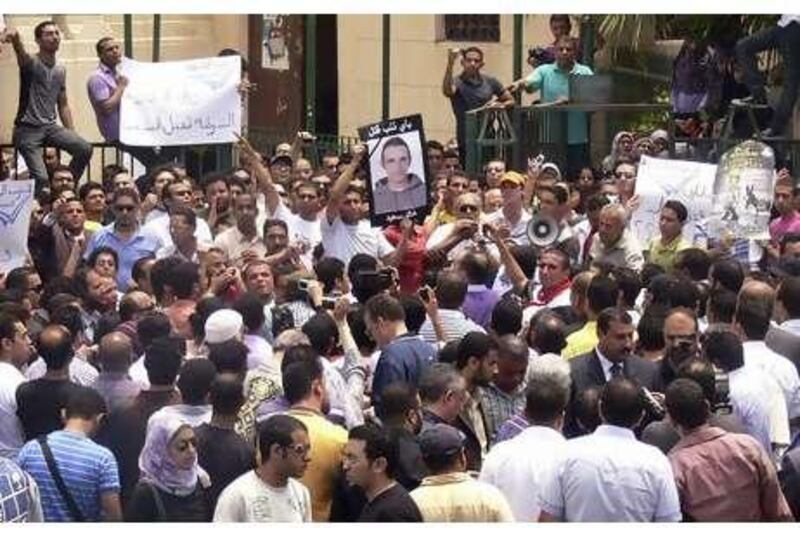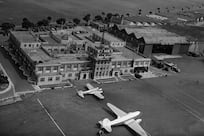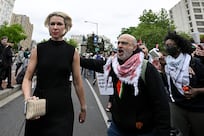CAIRO // More than 100 people gathered near Egypt's ministry of interior building yesterday afternoon to protest at the alleged murder of a 28-year-old man last week at the hands of the police. A phalanx of hundreds of police officers dressed in riot gear formed a circle around protesters in Lazoghly Square, a few blocks from the ministry building. Within the first hour of the demonstration, witnesses reported seeing plainclothes officers carry away at least a dozen protesters.
"Why have the Egyptian people surrendered?" chanted activists, some of whom were holding signs with pictures of the brutalised face of Khalid Said, who died under disputed circumstances in the Sedi Gabr area of Alexandria on June 6. Said's alleged killing has galvanised activists who have long complained about the expansive powers of Egypt's security forces, who human rights groups say use torture and beatings as a routine instrument of law enforcement.
Said's death came days before Egypt's Universal Periodic Review in front of the United Nations Human Rights Council in Geneva, which saw Egyptian civil society leaders express outrage over the government's continued use of violence in law enforcement and its suppression of political freedoms. Eyewitnesses claim the young businessman was beaten to death near an internet cafe by plainclothes police officers. According to Said's family, police were trying to suppress a digital video that showed officers dividing up narcotics and cash that had been seized in a drug bust. Said had hoped to post the video, which he had obtained from friends, on his blog in order to expose police corruption, family members said.
As public outrage mounted last week, the interior ministry released a statement on Saturday that contradicted activists' version of Said's death. According to the statement, "specific elements and circles" in the Egyptian public "exaggerated" the events around Said's death to defame the country's security services. The ministry's statement claimed that five witnesses were able to confirm that Said died from asphyxiation. Officers approached Said at an internet cafe with the intention of arresting him for two outstanding sentences for misdemeanor theft and small weapons possession. When Said saw the officers, he hastily swallowed a plastic bag of drugs in an attempt to conceal it from police.
But photos and videos that appeared on the internet in the past week tell a dramatically different story. One image shows Said's disfigured and bloody face with his jaw clearly broken. A video that circulated on Facebook yesterday shows an interview between Hassan Mosbah, the owner of the internet cafe where Said was captured, and a journalist for an opposition newspaper. Mr Mosbah described officers battering Said's head against a marble cafe table before dragging him to a neighbouring building.
"They came back after seven or eight minutes and were carrying him like a slaughtered sheep when they threw him in front of the building," Mr Mosbah said in the video. An ambulance picked up Said's corpse minutes later. In a telephone interview yesterday, Said's sister, Zahra Qasm, described Said as a thoughtful, reclusive young man who spent hours each day surfing the internet and listening to music on his computer.
"He was at the seaside with one of his friends. They were even wearing their shorts. They were planning on going home when one of his acquaintances invited him to the cyber cafe to show him something on the internet," Ms Qasm said. "So Khalid thought this man wanted help with something on the net, so he went with him. When he stepped inside the cafe, he was caught. The owner of the cafe will tell you that Khalid never frequents the cyber cafe."
Ms Qasm denied that there was an outstanding sentence for her brother to serve, who she said was not involved in politics. If the ministry's version of events was true, said Ms Qasm, uniformed officers would have arrested Said at his home. The image of Said's battered face rules out asphyxiation as the cause of death, she added. Several civil society groups organised yesterday's protest which, despite its modest size, saw police engaging in the same sort of behaviour demonstrators were opposing. Plainclothes police officers could be seen choking protesters as they carried them away from the crowd. Among the chants were calls for an investigation of Said's death and the resignation of Habib al Adly, Egypt's minister of interior.
Mohammed Abdel Aziz, a lawyer for the Nadim Centre for Rehabilitation of Victims of Violence, a Cairo-based non-governmental organisation, said Said's case was transferred yesterday to the public prosecutor's office in Cairo - an indication, he said, of the gravity of the controversy surrounding the alleged murder. Yesterday's protests in Cairo followed demonstrations the day before in Alexandria, where another demonstration is scheduled to take place tomorrow.
Despite the outrage, cases of police brutality are rarely punished. Nevertheless, Mr Abdel Aziz said yesterday's protests amount to the loudest reaction against police brutality since the Denshawai Incident of 1906, when British colonial authorities hanged seven Egyptians for attacking British officers who had accidently killed a local woman during a pigeon hunt. Historians consider the incident a turning point in Egypt's independence movement against British rule.
mbradley@thenational.ae





